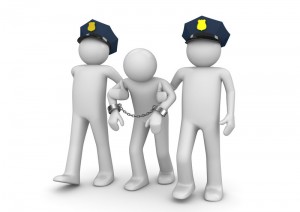“It Was Malicious Prosecution! See you in Court!”
Sitting in a coffeeshop, a man who was seen very angry told his friends who were having some drinks with him that he wanted to sue the police officer who brought embarrassment to him by bringing him to court after both argued over a parking space. This man said, “I wanted to park at the parking space, suddenly the police officer, who at that time was not in uniform, stopped my car from parking my car at the parking space. I only came to know he was a police officer after he handcuffed me in the presence of wife. There was a big curious crowd at that time and I was very embarrassed and helpless.”
One of his friends sitting with him then asked, “Why not you say that he had no authority to stop  you.” “How can I?” the man replied, “He was a police officer! The police officer said he had reserved the parking space for his girlfriend who would be coming on the way soon! Another friend after some vulgar words by him said “You must teach this police officer a lesson! He had abused his power!” The friend who was still raising his voice then said, “Who he thought he was! Teach him a lesson! I shall get you a good lawyer and sue him!”
you.” “How can I?” the man replied, “He was a police officer! The police officer said he had reserved the parking space for his girlfriend who would be coming on the way soon! Another friend after some vulgar words by him said “You must teach this police officer a lesson! He had abused his power!” The friend who was still raising his voice then said, “Who he thought he was! Teach him a lesson! I shall get you a good lawyer and sue him!”
It was just coincidental, that the police officer came to the coffeeshop with her girlfriend and the man stood up and pointed his finger at the police officer and shouted, “Who you think you are! You charged me! It was malicious prosecution! See you in court! There was nearly a fight and people around stopped the ugly scene..
Then What is Malicious Prosecution?
An action for malicious prosecution is a remedy for baseless and malicious litigation and is not limited to criminal but may also be brought in response to any baseless and malicious prosecution, whether civil or criminal. An action for damages can only be brought against whom a civil suit or criminal proceeding has been unsuccessfully commenced without probable cause and for a purpose other than that of bringing the alleged offender to justice. The criminal defendant or civil respondent in a baseless and malicious case may later file in civil court for a claim against the parties who took an active role in initiating or encouraging the original case. The defendant in the initial case becomes the plaintiff in the malicious prosecution suit and the plaintiff or prosecutor in the original case becomes the defendant. The case must be filed after the end of the trial of the original case and may involve damages for defamation, false arrest, false imprisonment or unlawful detention. This depends on facts of each case.
Purpose of Malicious Prosecution
The purpose of malicious prosecution is to seek compensation for various costs associated with having to defend against the  baseless and vexatious case. The damages or compensation can at times be very heavy as damages or compensation may include exemplary and or aggravated damages. The public policy that supports the action for malicious prosecution is the discouragement of vexatious litigation. The policy must compete against one that favours the freedom of law enforcement officers, judicial offers, and private citizens to participate and assist in the administration of justice.
baseless and vexatious case. The damages or compensation can at times be very heavy as damages or compensation may include exemplary and or aggravated damages. The public policy that supports the action for malicious prosecution is the discouragement of vexatious litigation. The policy must compete against one that favours the freedom of law enforcement officers, judicial offers, and private citizens to participate and assist in the administration of justice.
Before bringing action, there is a need for the plaintiff to find out whether there are statues giving immunity to certain persons from malicious prosecution for certain acts.
What to Prove in Malicious Prosecution?
To win a suit for malicious prosecution, the plaintiff must prove four elements:
- That the original case was terminated or ended in favour of the plaintiff;
- That the defendant had played an active role in the original case in prosecuting the plaintiff;
- That the defendant did not have any probable or reasonable grounds to support the original case; and,
- That the defendant initiated or continued the initial case with an improper purpose or ill will.
Each of these elements presents a daunting task for the plaintiff.
The Original Case Was Terminated in Favour of the Plaintiff
The original case must end before the defendant or respondent in that case is to file a malicious prosecution suit and this requirement is normally easy to prove. To qualify as a prosecution it need to prove that the defendant or respondent had to appear in court and it is not necessary that there was a trial. It is enough if the defendant or respondent was forced to answer a complaint in court. If the original case is being appealed, it is still not considered been terminated and the defendant or respondent must wait before filing a malicious prosecution suit.
In a malicious prosecution claim, the plaintiff must show that the original case has been concluded in his or her favour. How to determine this? If the original case was a criminal prosecution, it must be dismissed or rejected by court, abandoned or withdrawn by the prosecutor or been decided in favour of the accused at trial or on appeal. If the original case was a civil suit, the respondent must have won the trial or the trial court must have disposed of the case in favour of the respondent (now the plaintiff). However, if the recovery of the plaintiff in a civil action later on was reversed on appeal, this does not mean that the action been terminated in favour of the respondent. If the plaintiff won the original case by able to prove that the evidence been fabricated or by other fraudulent activity, the reversal on these grounds may be deemed a termination in favour of the respondent. It has to be noted that a settlement reached between the plaintiff and respondent in a civil suit is not a termination in favour of the respondent. In a criminal case, the courts also will not consider plea bargain in criminal case as termination in favour of the defendant.
The Defendant Played an Active Role in the Original Case
It must be proved that the defendant had played an active role in procuring or continuing with the prosecution of the original case and not a mere participant in the original case. It has to be noted that false testimony alone does not constitute malicious prosecution and further, witnesses are immune from suit for defamation even if a lie been told on the witness stand. This is because the concept of a fair and free trial requires that witnesses are to testify without fear of having to defend a defamation suit owing to their testimony. Is this fair?
In malicious prosecution case, the focus is on abuse of court or legal process, not on defamatory and or untruthful statements, but, it has to be noted that if a person helps another person to launch a baseless case or takes action to direct or aid such a case, then, the first person may be held for malicious prosecution. The defendant must be held responsible in institution or continuation of the baseless case. This position of responsibility does not always include criminal prosecutors and civil plaintiffs, for example, if the prosecutor bringing criminal charges is tricked into prosecuting the case by an untruthful third party, the deceiving party should be the one to be found liable for malicious prosecution, not the prosecutor.
The Defendant Did Not Have Probable Cause in Support of the Original Case
The plaintiff must prove that the person who initiated the prosecution did so without any probable cause and this generally means proving that the person did not have a reasonable belief in the plaintiff’s guilt or liability. To examine this,  the court need to look into several factors in which may include the reliability of sources, the availability of information, the effort required to obtain information, opportunities given to the accused person to offer an explanation, the accused’s reputation, the necessity in the original case for speedy judicial action or trial.
the court need to look into several factors in which may include the reliability of sources, the availability of information, the effort required to obtain information, opportunities given to the accused person to offer an explanation, the accused’s reputation, the necessity in the original case for speedy judicial action or trial.
It has to be noted that a failure to fully investigate the facts surrounding a case may be sufficient to prove a lack of probable cause. The termination of the original case in favour of the original defendant who now becomes the plaintiff may help to prove a lack of probable cause, but, this may not be a decisive factor on the issue. To win a case for malicious prosecution, the plaintiff need to present enough facts to allow a reasonable person to infer that the defendant acted without a reasonable belief in the plaintiff’s guilt or liability in the beginning or continuing the original case.
It has to be noted that in a criminal case, an acquittal does not constitute a lack of probable cause. A criminal defendant stands a better chance of proving lack of probable cause if the original case was dismissed or withdrawn by the prosecutors, the defendant or by the court before or during trial. The criminal process provides several safeguards against prosecutions that lack of probable cause so a full criminal trial tends to show the presence of probable cause, but, civil cases do not have the same safeguard, so a full civil trial does not tend to provide probable cause.
The Defendant Initiated or Continued the Original Case with Improper Purpose
In a malicious prosecution case, the plaintiff must prove with specific facts that the defendant instituted or continued the original proceeding with an improper purpose. It has to be noted that sheer ill will can constitute an improper purpose and it may be proved with facts that show that the defendant resented the plaintiff or wanted somehow to harm the plaintiff. However, there is no need for the plaintiff to prove that the defendant felt personal malice or hostility towards the plaintiff. What the plaintiff needs to do is only to show that the defendant was motivated by something other than the purpose of bringing the plaintiff to justice. There is an American case authority on this – see Hodges v. Gibson Products Co 811 P.2d 151 (Utah).
Damages
The plaintiff in an action for malicious prosecution can recover money from the defendant for certain harm suffered. Typical  injuries may include loss of reputation and credit, humiliation and mental suffering. If the original action was a criminal case, additional harm to be pleaded should include discomfort, injury to health, loss of time and deprivation of society with family.
injuries may include loss of reputation and credit, humiliation and mental suffering. If the original action was a criminal case, additional harm to be pleaded should include discomfort, injury to health, loss of time and deprivation of society with family.
If the plaintiff has suffered economic loss directly related to the original action, the plaintiff can also recover the amount lost and this include legal fees to lawyers and court costs incurred in defending the original case.
The plaintiff can also recover punitive damages. Punitive damages are imposed by the court to punish the misconduct by a party because an action for malicious prosecution requires proof of improper intent on the part of the defendant punitive damages commonly are awarded to malicious prosecution plaintiffs who win the damages awards.
Other Factors to Be Considered
In malicious prosecution cases, the court has to do some balancing act, that means, actions for malicious prosecution must compete against the public interest in allowing parties to purse cases unfettered by the specter of a retaliatory case. There are very few actions for malicious prosecution because of the difficulty to prove that the defendant procured or continued the original case without probable cause and with improper purpose.
Another factor that needs to be considered is immunity because generally, the law protects witnesses, police officers, judges, prosecutors and lawyers from suit for malicious prosecution. Witnesses are given immunity because justice requires that they testify without fear or from reprisals. Law enforcement and judicial officers are given immunity because they must be free to perform their duties and functions without continually defending against malicious prosecution cases.
However There Are Exceptions. What Are They?
If the law enforcement or judicial officers ventures outside the bounds of official duties and function s, to instigate or continue a malicious prosecution, the official may be vulnerable to a malicious prosecution suit. For example, if a prosecutor solicits fabricated testimony to be presented to court, the prosecutor may be sued for malicious prosecution. In such an instance, the prosecutor may only receive partial immunity in this instance because the solicitation of evidence is an administrative function, not a prosecutorial function.
Private parties may also at times enjoy immunity from actions for malicious prosecution, for example, a person who complains to a disciplinary committee about a professional because the general rule is to avoid discouraging the reporting of complaints in good faith against professional people.
_______________________________________________
Not sure whether you have been maliciously prosecuted?Want to know more about malicious prosecution?
Contact us at 082-235899 or email us at voons@voonslegal.com.
Follow us on Facebook : facebook.com/voonslaw

